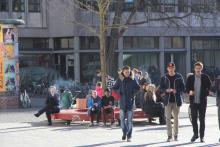The transfer of good practices among cities in Europe has been an important driver of local climate action since the forerunner cities became active in climate policy in the early 1990s. Although lesson-drawing has taken place since then, particularly by forerunner cities, there are also limitations. The diversity of cities with respect to their size, geographical location, social and economic structures and their position within national governance systems needs to be acknowledged.
Still, lessons can be learned in different areas:
- strategic approaches to post-carbon transitions,
- evidence-based institutional learning,
- visibility and awareness-raising through demonstration projects, and
- sector-specific initiatives (for the built environment, transport, waste, urban planning, etc.).
Given the diversity of cities and towns in Europe, there is no one-size-fits-all approach. However, certain preconditions are needed: post-carbon transitions require political and administrative leadership, a broad integration of and support for post-carbon objectives and initiatives, and the participation of citizens and stakeholders. In addition to charismatic leaders at a local level, transitions need to be supported by the member states and the EU.
This policy brief was prepared and written by Anne Jensen, AU, Inga Stumpp, IRS, Kristine Kern, IRS

